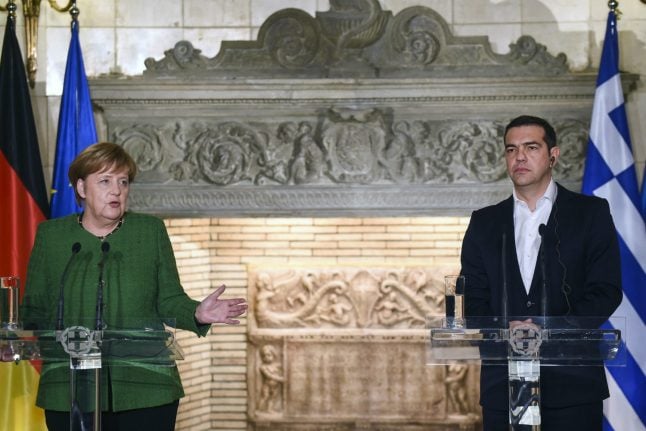Security was tightened during the minister’s visit, as Schäuble is a hate figure to many in Greece for championing the painful reforms that the heavily indebted country has had to undertake in exchange for billions in rescue funds.
Greece, now in its sixth straight year of recession, has been forced to undertake job, pay and pension cuts, in order to secure €240 billion in rescue funds put up by the European Union and International Monetary Fund.
“I am very impressed by what Greece has already achieved in rebalancing and modernising the economy,” Schäuble said, adding that Germany is ready to invest in a fund that provides liquidity to Greek companies.
Schäuble’s visit came just hours after the Greek parliament approved a new bill of reforms outlining the redeployment of 25,000 civil servants, despite days of street protests.
Under the bill, thousands of civil servants – including teachers and municipal police – have eight months on reduced salaries to find new posts elsewhere, or accept those offered to them. Otherwise, they will lose their jobs.
Greece needed to approve the bill in order to receive its next installment of €6.8 billion in rescue funds, which was approved by eurozone finance ministers last week.
Shortly before heading off to Athens, Schäuble told German public radio his visit “is a sign of encouragement that we support Greece on its difficult path.”
“We have confidence in what Greece is doing… we of course have to insist that Greece continue on this difficult path of pushing on with the agreed reforms,” he added.
Schäuble denied claims that Greece will face a financing gap of €50 billion by September, or that creditors would be forced to write off part of the debt. Instead, he said more financial help could be agreed next year if Greece stuck to the agreed path of reforms.
But public resentment is high in Greece after four years of austerity, which has sunk the country deep into six straight years of recession and sent unemployment soaring to a record 27 percent.
Many Greeks have blamed the EU’s biggest economy for not letting up in its push for reforms.
During Schäuble’s visit, police banned all public outdoor gatherings and demonstrations in a large swathe of the city centre including parliament, the seat of government and the German embassy.
The restrictions also applied to the entire route leading to Athens airport. Several metro stations were closed while traffic in the city centre was blocked.
Similar measures were taken for the visit of German Chancellor Angela Merkel in October.
On Wednesday, hundreds of protesters gathered outside parliament ahead of the late-night vote on the controversial reform bill, which also covers a partial overhaul of the tax system, including the introduction of new criteria for taxable income and the adjustment of tax thresholds.
The coalition government’s majority carried most of the tougher articles by a vote of 153 to 140. Greece is not expected to post growth before 2014.
AFP/jlb



 Please whitelist us to continue reading.
Please whitelist us to continue reading.
Member comments